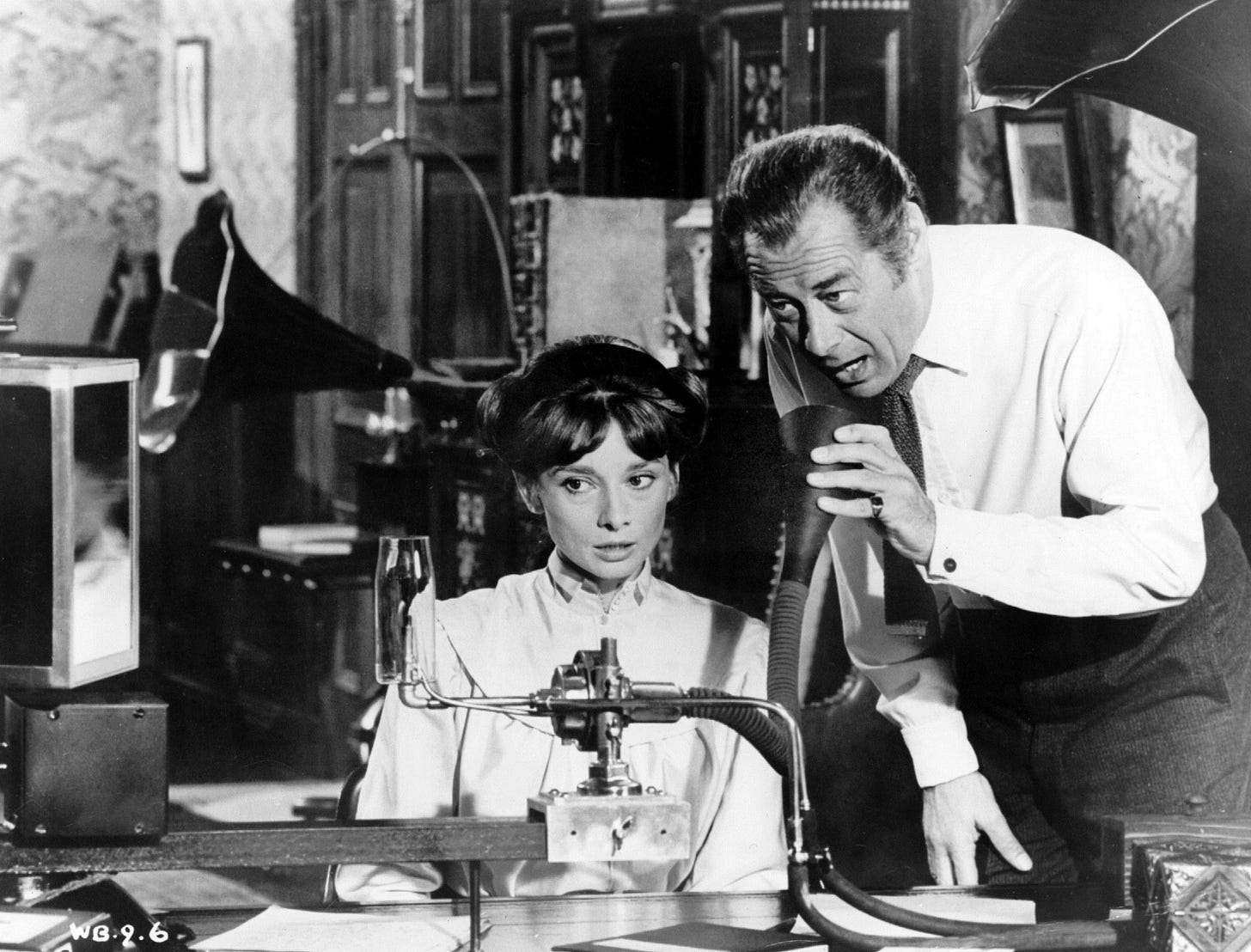Glottophobia, chestfeeding and a Danish pop song

Last year, a terrible crime. Shameful. Head-in-hands worthy. Jaws to the ground. “What in the name of holy bejaysus is this cowpat?” said one article. The Irish accent, butchered, so it was. Not seen since the days of Darby O’Gill and The Little People. Not only that, but by one of our own (well, OK, he’s Northern Irish but STILL) – the ever-so-handsome Jamie Dornan. Even his looks couldn’t let him get away with this calamity. I point to the culprit: Wild Mountain Thyme.
Quick history lesson. The Irish accent depicted in the film essentially stems from our British colonisers via the stage. What makes this fact worse is that the director himself, John Patrick Shanley, claims to be ‘pretty freaking Irish’ i.e. he’s Irish-American. Yet in response to the criticism, he said he had to make the accent more accessible to a global audience. But, really, he is just perpetuating nostalgic Ye Olde Ireland, a Hollywood view of Ireland as a backwater (Rosemary’s permanent smudge of dirt on otherwise impeccable makeup?). Listen, if you insist on reducing something to a stereotype, do it with style, à la Will Ferrell with his film Eurovision. We’d much rather a satire than some earnest ‘oh, yes, the Old Country’ paddywhackery. We beg of you. Move on. And no John, you cannot call yourself Irish after this.
How we treat people with regional accents is a serious issue that is gaining attention. France has just passed a law against glottophobia: discrimination against accents. It is now an offence alongside racism, sexism and other outlawed bigotry. Why? Two years ago a politician mocked a journalist’s southwestern pronunciation before asking if anyone had a question in “understandable French”. The law was approved last month by ninety-eight votes to three, and the maximum penalty is three years' imprisonment and a fine of €45,000. In Ireland, the political party Sinn Fein are now proposing similar legislation.
Accent gives language texture. It’s context. But there is a certain snobbery around accents which I have experienced myself, not just in the UK but abroad too. A few years ago, when I was teaching English in Italy, one of the host mothers (an Italian with perfect English) insisted she couldn’t understand me because I didn’t speak with a British accent. Granted, it’s what they hear when learning through Rosetta Stone or what have you, but even when I made the effort to speak s l o w l y and c l e a r l y, she refused. ‘It’s your Irish accent’, she’d insist. ‘You should try learning the British accent.’
By British, she meant RP (Received Pronunciation), which in the 1920s the BBC demanded all their broadcasters use. As the accent traditionally associated with the middle and upper classes, these efforts – initially to homogenise the British accent – only served to heighten class difference.
A century later, the accent hierarchy still exists. Some 28% of Britons feel discriminated against because of their accent and recent research shows that people over the age of 40 were more likely to judge a job candidate as less employable if they spoke with a regional or working-class accent, with Indian and Birmingham accents facing the most bias.
With nearly a quarter of employees changing the way they speak to fit in and employers encouraging accent softening, the TV show Industry does a great job of showing an issue that is common to many with a regional accent. One of the characters, Clement Cowan (played by Derek Riddell), reveals to his colleague that he is Scottish. In the comfort of his own home, he speaks in a soft brogue rather than the exceedingly polished RP he uses in the workplace.
An RP accent, even a modified one that combines it with regional qualities, is more prestigious because it’s associated with a certain social status and level of education, and it’s great that Industry highlights this. As the debate around representation on screen has gained traction in the past few years, we should not forget the importance of accurately representing the various accents our world has to offer. Take note Mr Shanley. - Aisling
Word of the month: Chestfeeding
Gender-neutral terms sparked a debate this month when a hospital in Brighton decided to implement inclusive language in its maternity services. The terms “chestfeeding” and “birthing parent” were part of the new vocabulary aimed at including trans and non-binary people.
But before you get too excited, we should note that these language changes only apply to the hospital’s internal communications – not when caring for individuals in a one-on-one setting. In other words, it has to do with documents reflecting the gender identity of patients.
The hospital explained they are adopting “a gender-additive approach, in order to ensure that everyone is represented and included”. The new terms will not replace existing ones but will be added alongside them: “breast/chestfeeding”, “mothers and birthing parents” and “father or second biological parent”.
It didn’t take long though, for the news to spark outrage on social media (with a lot of cisgender men voicing strong opinions). Not surprising if we consider our long history of policing women’s bodies and restricting the reproductive rights of sexual minorities. Misleading reports falsely stated the hospital was replacing language related to womanhood, resulting in some calling the changes “misogynistic”.
In recent years, the debate around terms relating to gender identity has intensified. Last summer, author JK Rowling was criticised for tweets in which she took issue with the phrase “people who menstruate”. Her followers were quick to point out that trans men and non-binary people also get periods and that not all women menstruate.
Language is ever evolving, but particularly when it comes to gender, linguistic changes seem to make people rage. Many were very upset at the prospect of using “they” as a gender-neutral singular pronoun in English (even though Shakespeare was known to do so). And in 2017, the Académie Française warned that inclusive writing posed a “mortal danger” to the French language.
This seems like one of those “dangerous” moments. But as language adapts to society, new words should be welcomed. Necessity is the mother of invention, after all, and why force people to describe their bodies in ways that don’t represent them? Plus, I doubt we’ll stop hearing the words “breastfeeding” and “mother” anytime soon. Don’t worry boys, they’re not going anywhere. - Julia
What we’re reading
Fancy a loquacious escape?—The Liar’s Dictionary is a new novel set at a dictionary publishing house. In the 19th century, a pesky man begins inserting unauthorised, fictitious entries into the dictionary (oh dear, sounds like a certain orange man in Victorian guise). It’s up to present day intern Mallory to save the day in advance of the dictionary’s digitisation. The suspense!
Spokane word — Covid-19 is taking a toll on Native American Languages. For these communities, deaths are doubly devastating when they strike elders, who pass on traditional knowledge to younger generations. But where ceremonial gatherings were not possible, social media groups have provided some remedies. This paints a more hopeful portrait of technology coming to the rescue.
It’s all Greek to me — Greece’s foremost linguist, Georgios Babiniotis, is the first to say that language evolves. But the wave of English words that have slipped into his language during the pandemic has led him to sound the linguistic alarm. “On television you hear phrases such as ‘rapid tests are being conducted via drive-through’, and almost all the words are in English,” he told The Observer. “It’s like I’m hearing Creole.” Almost no tongue has been spoken as continuously as Greek, and while English can’t be kept at bay completely, Babiniotis feels it should be protected. “I know what I say troubles some, but it is the duty of a linguist to speak out.”
Music to our ears — Babiniotis may be glad to hear that English language, however, is losing ground in other areas. While it has dominated international pop music for decades, things are starting to change, as this article in Vogue explains. The incredible rise of K-pop bands like BTS and Spanish-speaking artists like Bad Bunny and Rosalía are showing that singing in English is no longer a prerequisite for global success. And they’re not just paving the way for new artists to arise from all corners of the world, this appetite for non-English music is also inspiring more people to learn languages. I write this as I’m trying (and failing) to sing along to my new favourite Danish pop song.
Oral history—A new study ties India’s genetic diversity to language. Historically, geography is the biggest driver behind the genetic diversity of a population, and while that may be true in Europe, it is not for somewhere like India, where language and social systems determine how and where people live. “This is the first model that can take into account social, cultural, environmental and linguistic factors that shape the gene flow of populations” said Aritra Bose, one of the academics working on the study.
If you would like to support this newsletter, you can buy us a cup of coffee here. And if this email was forwarded to you, click the button below to subscribe.
About us:
Aisling O'Leary is an Irish journalist based in London, where she works at The Telegraph's travel desk. You can follow her on Twitter @JournoAsho
Julia Webster Ayuso is a Spanish-British freelance journalist based in Paris. Her writing has appeared in TIME, The Guardian and Monocle among others. You can follow her on Twitter @jwebsterayusoWe love hearing from you. Email us with any feedback, random thoughts and suggestions for future newsletters: beyondwordsnewsletter@gmail.com






